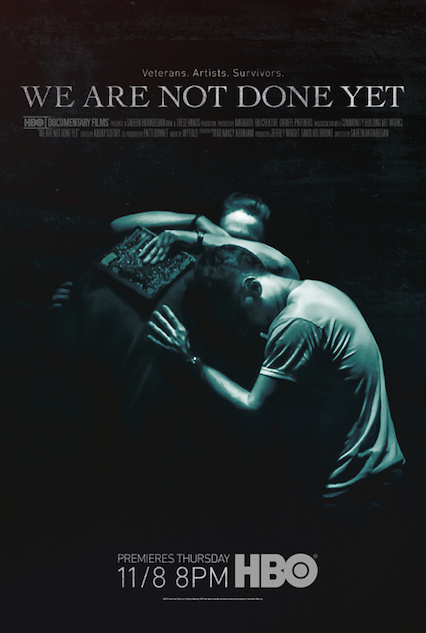In the military, there is a mantra that both on and off the battlefield “No Man is Left Behind.” Though comforting in theory, the new HBO documentary “We Are Not Done Yet” highlights how, in practice, this isn’t always the case. The title itself conveys the key concept of the entire documentary: veterans are not done with war as the effects of post-traumatic stress disorder leak into their everyday lives.
In her directorial debut, Sareen Hairabedian follows actor and producer Jeffrey Wright and poet Seema Reza as they lead a group of veterans through poetry writing workshops and rehearsals. Their practiced work culminates in the performance of a tear-jerking collaborative poem, directed by Wright himself.
Of the group, Hairabedian provides an in-depth look of five veterans. She described her desire of wanting to highlight a wide palette of stories from different cultural backgrounds. Whether a veteran is reckoning with being a single father or losing a friend, the varying stories all have one commonality: coping with sustained trauma from the military.
Hairabedian also looked to highlight the contrast between the trauma experienced by men and women. Women in the military deal with a different type of trauma which often goes ignored in this context: rape. A few of the female veterans discuss the sweep-it-under-the-rug culture of the military when it comes to sexual assault and PTSD treatment.
The documentary is beautiful in the way that it balances the harsh realities and honest stories told by the veterans, with no single narrative overriding the rest. While all the veterans were affected in different ways, the film shows how artistic expression services as a unifying force and cathartic outlet. When asked how the writing workshops helped the veterans, Hairabedian explained it was an opportunity for the veterans to channel their emotions through written prose instead of keeping it toxically internalized. She describes their writing as a “two-way art.” Hairabedian stressed the importance of hope and awareness when it comes to coping with PTSD, and hopes to affirm that veterans’ lives are still meaningful after war.
This call to action is the film’s finest quality. What you see on the screen are raw emotions cast out by real veterans in recovery, and that honesty is incredibly powerful and motivating. Wright and Reza both do a fantastic job of leading this small group through this recovery journey, and their leadership is infectious throughout the story. The viewer comes away significantly more aware of injustices faced by veterans, which leaves a desire to contribute in some way, small or large.
Email Daniel Devine at [email protected].






















































































































































